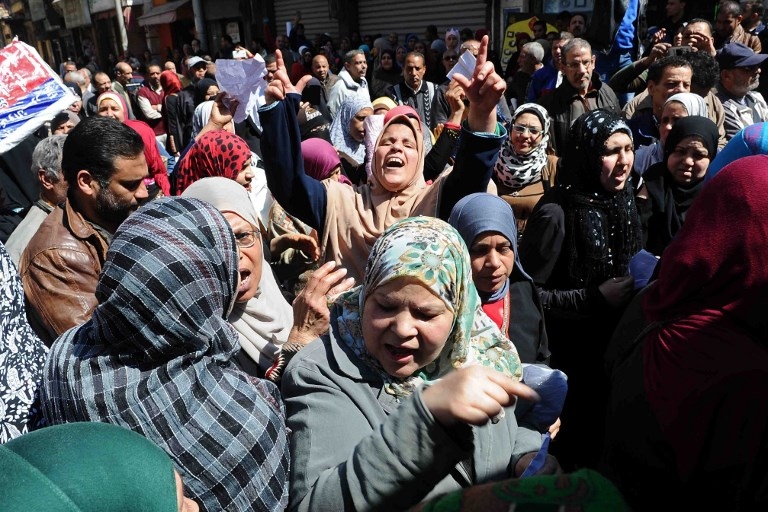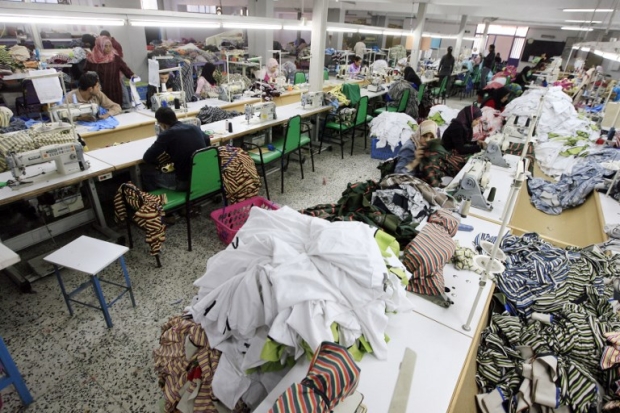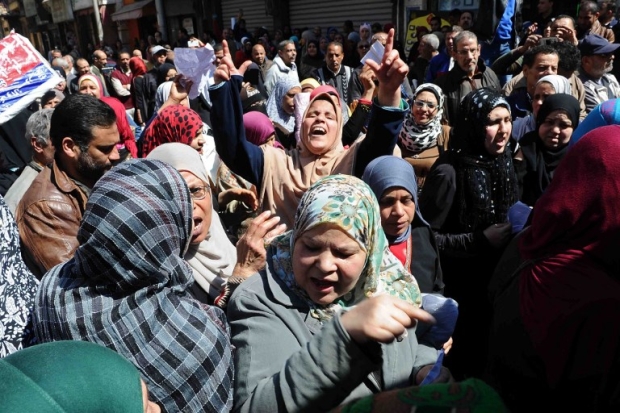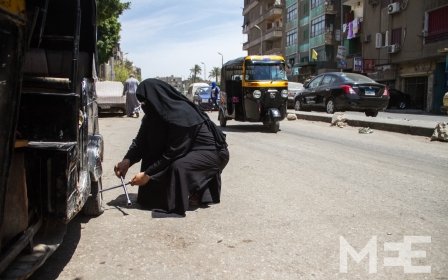Sisi marks Labour Day vowing to back 'anti-worker' law

CAIRO – Egyptian President Abdel Fattah al-Sisi recently marked Labour Day, traditionally a holiday to celebrate the achievements of workers, by vowing to push through punitive legislation that critics say will help big business at the expense of workers’ rights.
The draft law was introduced by the cabinet and referred to parliament in March, where lawmakers are expected to finish debating the proposed bill by the end of May.
This comes at a time where workers in Egypt continue to call for their rights, voicing the need for fairer working conditions and salaries, social and professional security.
This law will affect workers on all levels. Wages will stay frozen, working conditions will worsen, striking will become even harder, and so will making negotiations at workplaces
- Hoda Kamel, labour activist
But critics say the make-up of parliament means that workers face an uphill struggle to have their rights protected or even recognised.
“There is no parliament, and we have no free elections for the Labour Committee,” Moheb Aboud, a representative of the independent teachers’ union, told MEE, hinting at the lack of genuine labour representation within the legislative assembly.
Before 2014, parliament was elected with a 50 percent quota awarded to the representatives of workers and farmers, but the new constitution scrapped this stipulation.
Additionally, parliament’s labour committee is largely monopolised by the state-aligned Egyptian Trade Union Federation (ETUF), whose leadership is appointed directly by the Labour Ministry.
Trade unions suppressed
As a result, the composition of parliament has itself been received with strong opposition by the workforce, labour activists and the independent union movement.
The ETUF was the only legally recognised trade union in the country until 2009, when independent trade unions started to emerge.
It is openly dismissive of independent unions, describing them as “illegitimate and illegal“ and “a threat to national security.”
Independent trade unions, the ETUF adds, want little more than to divide and weaken the unity of the trade union movement.
That runs counter to the right to establish unions independently of state control, safeguarded by Article 76 of the constitution as well as by International Labour Organisation conventions 87 and 98, both ratified by Egypt.
The proposed Labour Law reflects the parliament’s contempt for the country’s workforce, activists say, and it has been largely rejected by much of the labour movement for its failure to address workers’ rights and freedoms.
“This law will affect workers on all levels. Wages will stay frozen, working conditions will worsen, striking will become even harder, and so will making negotiations at workplaces,” labour activist Hoda Kamel told MEE.
The Labour Ministry and parliament have largely excluded independent unions from taking part in the re-drafting process while allowing business associations to suggest changes so as to protect their interests, according to workers’ rights activists.
Critical voices silenced
Aboud is one of those critical voices who have been kept out of the parliament’s Labour Committee.
In pinpointing some of their demands, the former teacher said that workers must be able to elect their representatives in parliament freely and fairly, and a high council for labour should be established to apply policies that regulate the labour market and labour laws in line with citizens’ needs.
He added that a monitoring committee should oversee the work of the Labour Ministry, with disciplinary measures laid out for those workers and employers who violate the law.
Critics say that Sisi is keen to see the new law passed in parliament as soon as possible as he is under pressure from influential business owners.
Sisi urged the parliament to move forward with the Labour Law due to pressure from businessmen
- Fatma Ramadan, researcher
"It is important to stress that an equilibrium in work relations cannot take place without providing social protection to the weakest side (ie, the workers) and without the acknowledgement of businessmen about their social responsibility as well as the respect of work standards," stated the Center for Trade Union and Workers Services (CTUWS) in a press release issued on Labour Day under the slogan Social Justice and Union Freedoms.
“Sisi urged the parliament to move forward with the Labour Law due to pressure from businessmen, given that this draft is one-sided [and aims] to privilege company owners,” noted Fatma Ramadan, researcher and labour activist.
Ramadan sees several major problems with the new draft law, including end-of-service bonus pay being reduced from two months to one month per year of employment, and work contracts becoming permanent only after six years, not one, as previously.
The CTUWS has called for the need to secure a minimum salary for all workers, and one that takes into consideration rates of inflation, and to review the minimum state pensions allowances.
“As a retired teacher I’m on 1,000LE monthly pension, which is below $2 a day,” Aboud complained, referring to the World Bank’s $1.90 per day poverty threshold.
“What about those who earn even less? How can they possibly live?”
The National Council for Human Rights (NCHR) has also recommended an annual reconsideration of minimum wage, defining a strike, reconsidering child labour penalties and applying the law on domestic workers.
The NCHR added that the new law does not provide job security or solve un-regulated labour issues, adding that a stipulated duration for employment contracts should not be included, except in the case of temporary or seasonal work.
Key demands ignored
The council has also called on parliament to hold more hearing sessions before finally voting on the bill, as it “requires further societal discussions because of its impact”.
With regards to child labour, the constitution currently prohibits child labour, for those under 18 years of age.
However, the new law, as with the current law, only forbids those under 15 years of age from working, and offers child workers no protection.
And in reality, Aboud noted, many under-age children in Egypt drop out of school and work to support their families, and almost all of these child workers have no legal protection, and work on an informal basis, and many of them suffer ill-treatment from their employers.
"There is no appropriate punitive action against employers who breach the regulation of child labour,’’ he lamented, adding that: "the new draft introduces a penalty for wrongdoing which is set at between 200LE and 1,000LE,” the equivalent of $11 to $55.
The minimum obligatory annual increase is set at no less than seven percent of the basic salary, which is the basis for the calculation of social insurance.
Parliamentarians opposing the new draft claim that such an annual increase does not reflect today’s living costs.
“We actually wanted to have the percentage raised to 10 percent of the total wages,” Aboud said, referring to another counter-proposal put forward by MPs in the labour committee opposed to the new proposal.
Ramadan mentioned other issues in the law such as neglecting the question of arbitrary dismissal and not requiring collective negotiations between workers and management.
“Under this law, there is no obligation on the employers’ side to reach agreements with workers,” she said.
They are smart people, they’ve chosen a very weak moment for the labour movement
- Fatma Ramadan, researcher
“If the negotiation is not settled, the worker is required to cover unaffordable mediation costs amounting to 50,000 LE should he decide to take the dispute to a third party,” she added, the equivalent of $2,764.
Such negotiations can also be lengthy, and workers are forced to live on reduced salaries during this period, before the cases go to court.
Staging or participating in labour strikes may also lead to the dismissal of workers if they do not abide by prior administrative procedures, the labour researcher continued, meaning securing written authorisation from the company’s trade union, and notifying the management of start to end dates of strike – an unknown, as the duration is obviously dependent on whether demands are met.
Discouraging disputes
This tactic, she said, is a “very clear way” to discourage workers from planning industrial action.
MP Khaled Shaban, who is member of the parliament’s labour committee, is pushing for some modifications to the bill.
Social security contributions, in his view, should be paid by the employer from the worker’s total wages, and not from basic and variable salaries only. He also argued that Egyptian workers abroad should be registered with the labour ministry, and their employment contracts too so, in case of labour disputes, employees are enabled to claim their rights.
The new law 'clearly favours business owners'
- Khaled Shaban, MP
“I stand against this new law,” Shaban commented, "It clearly favours business owners".
It has been a highly contentious piece of legislation, he added, stating that “even the State Council has 64 remarks on the draft.”
Many categories of worker are excluded from the new bill altogether, including domestic servants, farmers and agricultural workers (65 percent of whom are women), Aboud said.
With regards to maternity leave, Ramadan pointed to one “discriminatory” provision in the new law giving four months to women in the governmental sector and only three months to those in the private sector.
The current stipulation that public and private companies have a work force including at least five percent disabled staff has not been raised, she added, and no clause referring to disabled-friendly facilities at workplaces has been introduced.
Worsening labour climate
Discussion of the new law comes against a backdrop of worsening labour conditions, particularly following a series of price increases that were part of the harsh economic reforms introduced by the government in return for the $12 billion IMF loan. Prices of most products, including basic goods, spiked in a very short period with a heavy toll on low-income and middle class Egyptians.
In a report published to mark Labour Day, Amnesty International denounced that dozens of workers and trade unionists in Egypt have faced arbitrary arrest, detention, dismissal from work or military trials, simply for exercising their right to strike and form independent trade unions.
The Democracy Index reported that Egypt saw 244 industrial actions between May 2016 and April 2017, with these strikes leading to 186 arrests and the suspension of 2,691 workers.
However, because of increasing security restrictions, the year 2017 witnessed a decrease of 44 percent in industrial strike action, according to the index.
“They are smart people, they’ve chosen a very weak moment for the labour movement, which is retreating from the revolutionary days, to pass a series of labour-related laws, drafted from their point of view,” said Ramadan.
Middle East Eye propose une couverture et une analyse indépendantes et incomparables du Moyen-Orient, de l’Afrique du Nord et d’autres régions du monde. Pour en savoir plus sur la reprise de ce contenu et les frais qui s’appliquent, veuillez remplir ce formulaire [en anglais]. Pour en savoir plus sur MEE, cliquez ici [en anglais].







